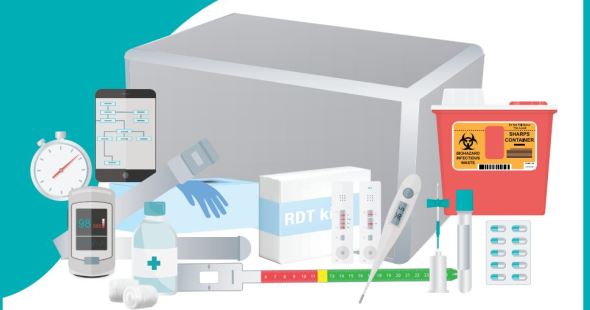e-Health toolkit for clinical decision making

What is this project?
The eHealth toolkit brings together a suite of electronic clinical decision-support algorithms, point-of-care diagnostics, and implementation guidelines. It has been designed with and for use by primary care health workers in resource-limited settings, to reach and diagnose children with fever so as to support informed treatment or triaging decisions.
Why are we working on it?
Every year, millions of children die before their fifth birthday due to treatable conditions including malaria, diarrhoea and pneumonia, largely because the tools available to health professionals for diagnosing and managing illnesses are limited in resource-poor settings. Diagnostics help optimize the use of existing drugs as well as new treatments. With diagnostics, better patient management decisions can be made.
Diagnosis and clinical decisions in these contexts are often limited by funding, low levels of education and poor infrastructure. The remarkable rise of smart mobile devices in recent years offers significant potential for healthcare, but successful integration of this technology into existing infrastructure has frequently proved to be a barrier to implementation. Financial sustainability and scalability are also potential stumbling blocks in low- and middle-income countries.
Engaging end-user communities in the development of eHealth initiatives has proved to be key to successful integration and deployment.
What does it involve?
Work to develop the eHealth toolkit focuses on building evidence for the use of point-of-care diagnostics and electronic clinical decision-support algorithms (CDSAs) and capacity building among community health workers to use these tools.
Guidance documentation will facilitate development and adoption of these tools. A target product profile for electronic CDSAs has been developed in partnership with WHO to support uptake of the point-of-care diagnostics, and ensure that R&D and implementation activities are focused on evidence, and designed for the contexts and needs of those who will be using them.
We are also working to build global consensus for these tools by generating clinical evidence for individual algorithms to support clinical care and disease surveillance. Evidence will consist of country pilots where various tools will be studied (usability, impact on clinical outcome, impact on antibiotic prescription, and feasibility to integrate surveillance systems). A successful pilot study in Kano State, Nigeria, showed that assessments provided by healthcare workers were of higher quality when they used a validated electronic clinical algorithm. Community health workers were trained to carry out physician-like clinical assessments on children between the ages of 2 months and 5 years presenting at health facilities. They were also trained on the use of malaria rapid diagnostic tests when guided by the algorithm for a febrile case and how to interpret the test results. The data allowed the team, almost in real-time, to see the types of illnesses present in the area, the number of positive malaria cases, and user performance metrics
Two other country pilots are currently ongoing. One pilot using a Dengue Module combined with dengue rapid diagnostic tests (RDTs) is ongoing in Burkina Faso in collaboration with Terre des hommes and the Ministry of Health of Burkina Faso. Another pilot, using a Febrile Illness Syndromic Module combined with malaria, dengue and streptococcus group A RDTs, is ongoing in Senegal in collaboration with Dimagi Inc. and Institut Pasteur de Dakar.
After building evidence, we aim to support our country partners in operationalizing use of CDS tools at primary care.
What do we expect to achieve?
This work will help to identify baseline criteria for clinical decision support tools that can improve access to quality care in resource-limited settings, as well as generating data that can inform healthcare system responses.
What is the timescale?
These eHealth toolkit activities began in 2018.
Partners and funding
Assessment of the use of electronic clinical decision support algorithms is being conducted in collaboration with partners including Terre des hommes, THINKMD, Policlinique Médicale Universitaire, eHealth Africa, Ministry of Health of Burkina Faso, Dimagi Inc., IT4Life and Institut Pasteur de Dakar.
This project is supported by Fondation Botnar and the Global Antimicrobial Resistance Innovation Fund (GAMRIF), a UK aid programme
More information
FACTSHEET: e-Health Toolkit
For more information please contact us.
Quick links
- Report - Landscape analysis report for severity assessment and triage and home self-monitoring AFI tools for LMICs
- Presentation - Landscape analysis report for severity assessment and triage and home self-monitoring AFI tools for LMICs
- AFRO ACDx course
- Development and validation of manually modified and supervised machine Learning clinical assessment algorithms for malaria in nigerian children
- Target product profile for clinical decision support algorithms
- World Health Assembly Newsletter
- BMJ Global Health blog on WHA event
- Target product profile on FIND website
- FIND/WHO workshop: standardized clinical decision-support algorithms

